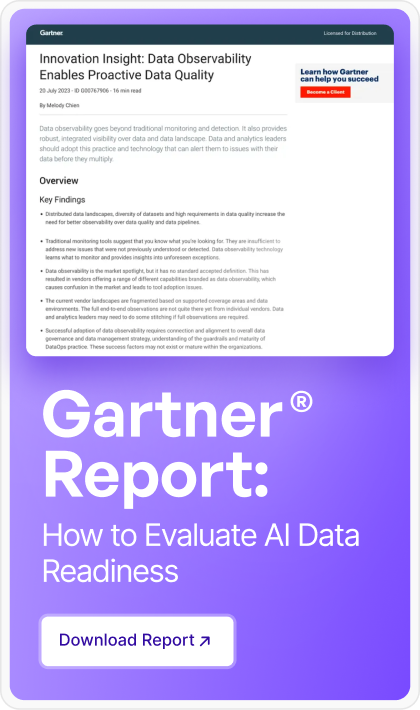Why data observability is critical for thriving in 2025’s tariff-driven trade landscape.
Recent U.S. tariff policies targeting key trading partners like China, Canada, and Mexico have reshaped global trade, introducing new dynamics into supply chains and enterprise operations. These changes require businesses to adapt quickly to manage costs, optimize logistics, and meet evolving market demands.
In this fast-moving environment, one truth stands out:
Enterprises that harness near real-time, actionable insights from their data will not only adapt but excel.
This is where robust data observability solutions, like those from Acceldata, become mission-critical.
The Tariff-Driven Data Opportunity
Tariffs are a powerful force in today’s global economy, creating both challenges and opportunities for enterprises. For example, 89% of U.S. manufacturers reported that tariffs increased the cost of doing business by an average of 8%, with over half adjusting their growth strategies.

Businesses are navigating:
- Supply Chain Adjustments: Explore new suppliers, optimize logistics, or adapt to cost changes, often on tight timelines.
- Cost Management: Forecast precisely and protect margins to maintain competitiveness.
- Regulatory Compliance: Adhere to trade regulations with accurate tracking and reporting.
- Customer Expectations: Deliver seamless service and value, regardless of market shifts.
These dynamics underscore a critical need: data. Enterprises must have near real-time visibility into their supply chains, financials, and operations to make informed decisions. Fragmented data pipelines, siloed systems, or unreliable analytics, however, can obscure opportunities and hinder agility.
These challenges come to life in industries like automotive, where recent EV battery tariffs highlight the power of data observability.
Real-World Impact: Automotive Industry Navigates EV Battery Tariffs
In 2025, the Biden administration’s tariffs on Chinese electric vehicle (EV) batteries, raised to 25% under Section 301, increased costs for the automotive sector.
A leading U.S. automaker faced rising component prices and supply chain delays. By leveraging data observability, the company:
- Gained near real-time insights into alternative suppliers in Vietnam and India.
- Rerouted logistics.
- Cut costs by 12% and avoided production halts. [Source: Industry Supply Chain Case Studies (2024-2025)]
Why Data Observability Is the Answer
Data observability—the ability to monitor, manage, and ensure the health of data across its entire lifecycle—empowers enterprises to act with precision. Here’s how:
Comprehensive Supply Chain Visibility
Tariffs can rapidly shift supply chain dynamics. Data observability provides a 360-degree view of performance, identifying bottlenecks, delays, or cost spikes before they escalate. Acceldata’s platform monitors data flows from procurement to delivery, ensuring decisions are based on accurate, near real-time insights.
For the tasked with integrating supply chain systems, Acceldata unifies data sources for rapid, confident decisions.
Cost Optimization in Dynamic Markets
Tariffs heighten pressure on profitability. Acceldata’s platform enables enterprises to:
- Identify high-cost suppliers.
- Optimize logistics routes.
- Eliminate redundant processes.
Advanced analytics pinpoint cost drivers across complex datasets, empowering decisive action to protect margins.
Compliance and Risk Mitigation
Tariff regulations come with strict reporting mandates. Acceldata’s platform ensures:
- Data integrity and traceability.
- Audit-ready reporting.
- Early detection of anomalies in trade data.
For the chief data officer managing regulatory risk, Acceldata delivers transparency for compliance readiness.
Customer-Centric Agility
Customer satisfaction doesn’t pause for trade policy. Acceldata’s platform enables businesses to:
- Anticipate demand shifts.
- Optimize inventory.
- Adjust pricing dynamically.
By integrating CRM, ERP, and supply chain data, Acceldata keeps operations aligned with market demands.
For the data analyst tracking customer behavior, Acceldata enables proactive decisions to boost responsiveness.
Acceldata: Your Partner in a Tariff-Driven World
At Acceldata, we know that succeeding in a tariff-influenced market requires a strategic approach to data. Our enterprise-grade platform, now evolving into Agentic Data Management, empowers organizations to:
- Unify Data Silos: Integrate all sources into a trusted data foundation.
- Detect Issues Early: Proactively resolve data pipeline issues with AI-powered automation, critical for tariff-driven agility.
- Scale with Confidence: Operate at enterprise volumes across hybrid environments.
- Drive Actionable Insights: Turn raw data into decisions that protect margins and enhance agility.
The Path Forward
U.S. tariff policies are reshaping global trade, but with the right data strategy, challenges become opportunities. By delivering near real-time visibility, cost control, compliance readiness, and customer-centric agility, Acceldata is helping enterprises not just adapt but lead.
Want to go deeper?
Download our guide, 10 Data Strategies to Navigate Tariff Shocks in 2025, to learn how observability empowers smarter supply chain decisions and long-term resilience.








.png)








.webp)
.webp)


